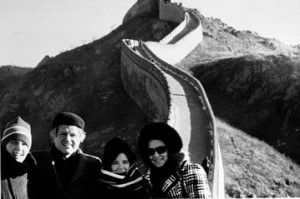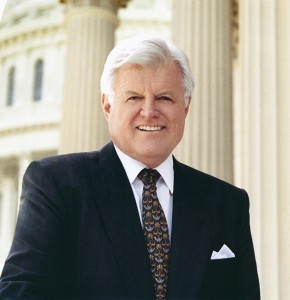Jerome Cohen on the Importance of Ted Kennedy in US-China Relations
Timing is everything and Prof. Jerome Cohen seems to have a particular knack for it. As various book reviews of Henry Kissinger’s On China revisit the role Kissinger and Nixon played in opening China, Prof. Cohen offers a different – and too often ignored – narrative of Nixon’s 1972 visit: the importance of the late Senator Ted Kennedy in pushing the U.S. into a policy of detente with China and eventual normalization of relations between the two countries.
For Cohen, who first began advising Sen. Ted Kennedy on China issues in 1966, it was neither Nixon nor Kissinger who had the courage to first push the country toward normalizing relations with China. Instead, it was Sen. Kennedy. By 1969, Kennedy had formulated a sound and forceful China policy, urging the U.S. government to seek recognition of the mainland while maintaining its commitment to protecting Taiwan. It was his speech at the inaugural meeting of the National Committee on U.S.-China Relations in March 1969 that forced President Nixon to re-evaluate his own position on China. Fearful that Kennedy might win the 1972 presidential election on his increasingly popular China stance, Nixon quickly urged his National Security Adviser, Henry Kissinger, to get him to China. Kissinger’s success in planning Nixon’s February 1972 trip to China is one of the factors that caused Nixon to win the election that fall.
Cohen’s eight-page essay on his experience of advising Ted Kennedy and working with him on China offers a startling perspective on the late Senator. Best known for his domestic policy and legislation, Kennedy’s contribution to foreign policy, particularly as it pertains to China, is not often discussed. Cohen points out that even Kennedy himself failed to recognize his importance to opening China – in his own memoir, Kennedy spends less than a page discussing his involvement with China in the late 60s and early 70s.
Cohen ends his essay with a more familiar Kennedy – one who understood the art of diplomacy and that politics, no matter the culture, is an important factor. As the Carter Administration continuous hit road block after road block in dealing with China, it was Kennedy’s December 1977 trip to Beijing that altered the course and allowed the two countries to normalize relations. A year later, Carter basically adopted the Kennedy plan of recognizing the mainland as the “one China” but maintaining the policy of defense of Taiwan.
To read the full essay, click here.
Jerome Cohen’s “Ted Kennedy’s Role in Restoring Diplomatic Relations with China” is featured in NYU Journal of Legislation and Public Policy, Volume 14, Issue 2, commemorating the work of Senator Edward Kennedy
 On Facebook
On Facebook By Email
By Email 

